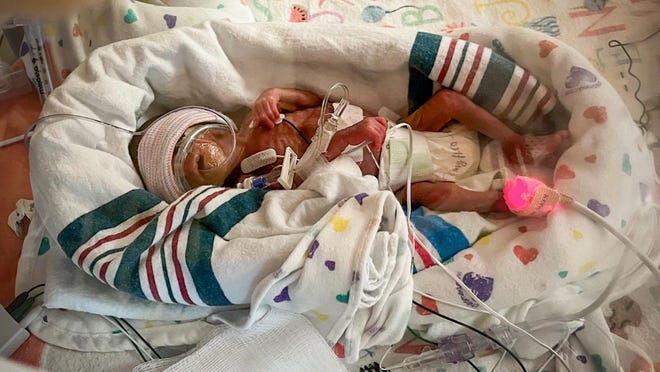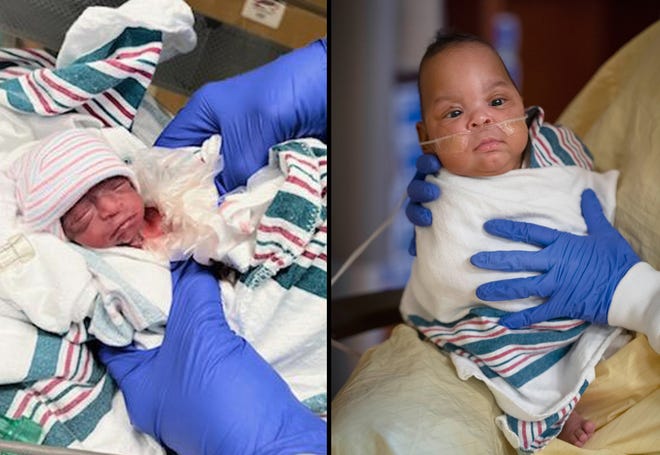BOCA RATON
Preemie Cheyenne Tomblin was the tiniest baby West Boca Medical Center has known.
BOCA RATON — The nurses at West Boca Medical Center call Cheyenne Tomblin the “beyond a miracle” baby. She was born weighing only 12 ounces and measuring just over 10 inches. She is the smallest baby born at the hospital and is among the smallest babies ever born in the world.
Today, she weighs 9 pounds, 5 ounces, and is ready to go home with her mother after almost six months in the NICU.
Her mother, Czierrah Tomblin of North Lauderdale, told Cheyenne’s story this week at the hospital, along with the doctors and nurses who have cared for her.
All of them acknowledged the challenge of helping such a tiny preemie grow outside her mother’s womb, but they said Cheyenne’s alertness and resilience over the past six months made them believe she would one day head home.
“She fought the odds. If this 12-ounce baby made it, that’ll tell you: There’s a lot of girl power here,” said Florient Alexis, who has been a nurse for over 45 years and was part of the team that cared for Cheyenne.
Mom’s preeclampsia led to emergency cesarean section at 24 weeks
Cheyenne is Tomblin’s first child, and she was born when Tomblin was only 24 weeks along. Tomblin had such worrying levels of blood pressure that doctors gave her an emergency cesarean section 16 whole weeks earlier than the typical 40-week pregnancy period.
She had a history of chronic hypertension
— high blood pressure — and developed preeclampsia during her pregnancy. She didn’t realize how small Cheyenne was when she first gave birth.
“(Cheyenne) came here unexpectedly. I was told she was coming today and I was like, ‘Is this really happening?’ ” said Tomblin, 34. “But everyone was telling me, ‘You got this’, so I was OK. … I felt relaxed and it was ‘go’ time.”
And so Cheyenne was born at 4:32 p.m. Sept. 11, 2022. It was the day before her mother’s birthday, so she was welcomed with birthday balloons originally meant for her mother. She was alert and looked at her mom directly in the eyes after she was born.
“It didn’t hit me that she was tiny,” Tomblin said. “I knew she was small, but the whole 12 ounces thing wasn’t told to me until afterward.”
The medical team focused on how her head and lungs grew, along with maintaining her body temperature at the right warmth from that point onward. She did not have to undergo any operations.
“This child was no longer growing in utero, which was the main concern,” Dr. Penna Reddy, a neonatologist at West Boca, said Tuesday. “These babies have a high risk of mortality because they’re still going through the motions of growth, which are supposed to be done while the baby’s inside (the mother’s womb).”
Doctors to watch baby’s lung development going forward
Despite the challenge of a preemie that small, the entire medical team was “very hopeful” for Cheyenne’s survival from the first time first they saw her because she was alert and reactive from the start, the staff said.
Alexis called this experience the highlight of her profession.
“When I first saw her, I was shivering, thinking, ‘What are we going to do with this baby?’ ” Alexis said. “But all of a sudden, the doctor and I heard a little voice crying at us. She was moving, crying, her heart rate was good and she was active.”
At that moment, Alexis found herself crying, and she is not known as much of a crier among the other hospital staff.
“I thought to myself, ‘This baby just saved the day,’ ” Alexis said. “Honestly, we didn’t know what we could do with 12 ounces of a baby girl. But we took her to the NICU and went from there.”
Cheyenne, who has dark hair and blue-green eyes, isn’t the smallest baby ever born. That honor rests with Kwek Yu Xuan, who was born at 7.5 ounces — the weight of an apple — in June 2020 in Singapore. Her mother also suffered from preeclampsia and gave birth by an emergency C-section, according to the BBC. And her stay in the hospital lasted 13 months.
But the smallest baby West Boca Medical Center has known is expected to come home with her mother for the first time by the weekend. It’s too soon to know if Cheyenne will encounter any health issues as she grows, but the medical team will continue monitoring the baby’s lung development going forward.

Tomblin found a major source of encouragement from the medical team, which she leaned on for support whenever she worried if Cheyenne would ever come home.
“Everything I thought I knew has turned upside down. The first two months were rocky, but every single day, (the nurses) told me I was OK,” Tomblin said. “It’s like a family here. The support and encouragement have been very reassuring.”